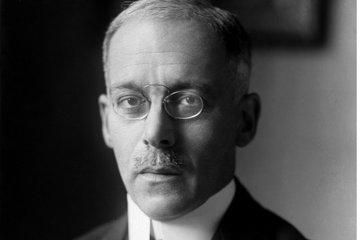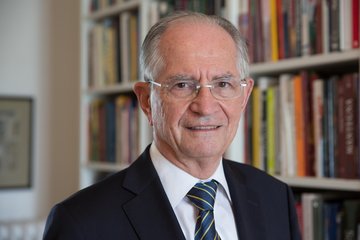
Self-reflection in Corporate Law
An interim assessment and a look ahead
Discourse analysis has a long tradition in academia. In the context of his research on the "microcosm of corporate law", Holger Fleischer undertakes to assess corporate law as an academic discipline. Having reference to Pierre Bourdieu, he states that a necessary condition of academic work is a critical examination of the traditions of thought and research that are specific to a given discipline.
Why this critical look in the mirror now? "Company law is currently undergoing a profound functional change," says Fleischer. Increasingly often, what is supposed to be purely organizational law is being used to implement the goals of society as a whole. Political issues such as gender equality, human rights, or climate protection have already found expression in corporate law, accounting law, and capital markets law. Moreover, companies exclusively oriented on profit are no longer the sole focus. Social enterprises having a dual purpose are attracting growing attention. "The shift towards transformative corporate law is not a transitory phenomenon but rather heralds a new era. In recent years, society's expectations in respect of entrepreneurial activity have fundamentally changed. It can be expected that this development will continue under the influence of millennials and post-millennials."
Mapping the field’s position as an academic discipline
"Having blossomed for decades, corporate law scholarship has reached a phase of maturation," Fleischer states. He compares this stage of development to standing on a plateau: "Not only does this allow us to take in meaningful and comprehensive views, it also makes recognizable the proximity to a critical tipping point."

„The shift towards transformative corporate law is not a transitory phenomenon but rather heralds a new era.“
– Institute Director Holger Fleischer –
The mental and material efforts of several generations of researchers – based on the US conception of the discipline - have long ensured corporate law's status as the "hottest game in town". Yet Fleischer notes that the numerous postdoctoral and doctoral dissertations as well as the increasing number of commentaries have led to an oversaturation of material. The consequence, in his view, is an increasing academic exodus, especially by younger academics, from the core area of corporate law to the fields of finance and capital markets law.
To revitalize corporate law research, Fleischer, whose own back ground is in both law and economics, urges more context sensitivity, experimentation, and innovation. Future issues, such as those arising from the digital revolution, artificial intelligence, or changing values in respect of sustainability, demonstrate the necessity of embedding corporate law norms and decisions into a comprehensive historical, economic, social, and political context. And from innovative forms of entrepreneurial organization to new intersectional issues such as supply-chain law, there is no shortage of pathbreaking subjects for exploration and academic treatment.
Postdoctoral Dissertations as Barometers of Academic Progress
According to Fleischer, postdoctoral disserations (Habilitationsschriften) have made a significant contribution to the development of the corporate law discipline. In his essay "Gesellschaftsrecht im Spiegel seiner Habilitationsschriften" (Company Law through the Lens of Postdoctoral Theses), he collectively considers for the first time the corpus of relevant work authored over the past eight decades.
Which criteria should be used in assigning these monographs to the spectrum of corporate law scholarship? Fleischer's definition includes all works that have at least one focal point falling in the field of corporate law. In addition, he includes dissertations on capital markets law and those touching upon the law of foundations. This yields an inventory of 138 works.
Although postdoctoral theses on corporate law, like the field as a whole, are characterized by great practical relevance, Fleischer observes that they are marked by a diversity of methodolgical approaches. Owing to the fragmentation of German company law into many individual provisions and laws, ranging from the BGB to the GmbHG, legal theory is of particular importance. Comparative law serves as an additional source of inspiration and perspective. While a law and economics approach is assuming a steadily increasing foothold, the links to legal sociology have remained isolated. According to Fleischer, one also observes in Habilitationsschriften the ahistorical quality that has traditionally typified research in corporate law, with a few laudable exceptions.
"Habilitation theses are and have been beacons in corporate law research primarily because they reveal larger contexts, uncover hidden structures, formulate principles of valuation, and contribute to the creation of systemic structures." Young academics, he says, must master macro- and micro-perspectives. To illustrate this, Fleischer draws on an image fashioned by the historian Jürgen Osterhammel on the flight path of an eagle: "With its lofty height, it has a broad overview, yet it keeps a firm eye on the details on the ground."
Corporate Law Through the Lens of Great Debates
A publication series of Fleischer‘s own initiation is introduced by his essay “Große Debatten im Gesellschaftsrecht: Fiktionstheorie versus Theorie der realen Verbandspersönlichkeit im internationalen Diskurs” (Great Debates in Company Law: The International Discourse on Fiction Theory versus Real Entity Theory). From the analysis of scattered individual debates, an overall picture should emerge that makes visible the larger lines of development and the evolutionary processes of corporate law in the 19th and 20th centuries.
The classical discourse on the nature of a legal person serves as a touchstone for the inquiry. The famous civil law scholars Friedrich Carl von Savigny and Otto von Gierke engaged in an intellectual debate in the 19th century which is experiencing an unexpected renaissance in the new millennium. "The wrangling over the role of the legal person in law, in economics, and in society is once again in full swing," says Fleischer. "While the debate may once have centred on the legal recognition of corporations as guarantors of freedom vis-à-vis the state, today the legal person, as the embodiment of powerful multinational corporations, is perceived as a threat to our free society. The competing legal theories and the embodied knowledge provide valuable orientation and are a basis for reflection, but more than ever they demand a broadening of perspective so as to include insights from related fields."
Further Reading
Images: © Max Planck Institute for Comparative and International Private Law / Johanna Detering












